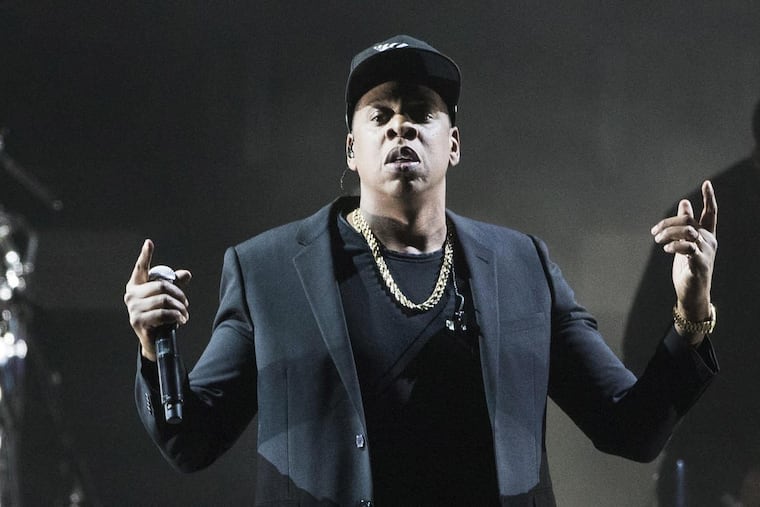Review: Jay-Z, soul searching and apologetic, on '4:44'
The rapper is contrite on his thirteenth solo album, a partial response to Beyonce's 'Lemonade.'

How many times does Jay-Z have to say he's sorry?
A lot.
On "4:44," the title track to the new album by the rapper and entertainment mogul who will headline his own party at this year's Budweiser Made in America festival in Philadelphia on Labor Day weekend, the word apologize is enunciated — count 'em — seven times.
That title song to 4:44 (Roc Nation ***) is the centerpiece of the 10-track, stripped-down album that's the follow-up to 2014's all-but-forgotten Magna Carta … Holy Grail. More to the point, it's the first musical response from the once-again-hyphenated rapper since his wife, Beyonce, raked him over the coals on last year's fierce and fabulous Lemonade for his infidelities.
Jay-Z's album was produced in its entirety by Dion "No I.D." Wilson and was — annoyingly — initially available only to Sprint customers and to those who were already subscribers to Jay-Z's streaming service, Tidal, before it was released Friday. (At 4:44 p.m. on Monday afternoon, it became available to all Tidal customers.) That exclusive deal is expected to last a week, so in all likelihood, it will be widely available this weekend for sale and on streaming services like Apple Music and Spotify.
4:44 — so named because the rapper wrote the title song, he says, after waking up in the middle of the night at precisely that time — isn't a full-length point-by-point retort to Lemonade. But the 47-year-old rapper doesn't shy away from the subject in the least, getting right to the elephant in the room on the self-targeting "Kill Jay Z." He not only only brings up his legendary 2014 elevator scuffle with Beyonce's sister Solange Knowles, but also raps: "You almost went Eric Benet / Let the baddest girl in the world get away." (That's a reference to R&B singer Benet's 2005 divorce from actress Halle Berry.)
And 4:44 really becomes an act of contrition on the title cut: "Look, I apologize, often womanize / Took for my child to be born to see through a woman's eyes." Jay-Z has always played it cool, with supreme confidence and invulnerability, the mark of a superior rhymer who keeps his hat in the ring in the greatest-rapper-of-all-time sweepstakes. (Last month, he was honored by former President Barack Obama, among others, when he became the first rapper inducted into the Songwriters Hall of Fame.)
4:44′s strength comes from its willingness to toss that steely exterior away.
The album is at its best when most forthright. The most heartbreaking moment comes on the title track. "I seen the innocence leave your eyes / I still mourn this death," he raps, and goes on to bring up his wife's 2011 miscarriage. Many details are deeply personal, but apparently, all had to meet the approval of an exacting editor. "I always call Bey our de facto A&R," producer Wilson told the New York Times. "Every song has to get past her ears."
"I apologize to all the women whom I toyed with your emotions because I was emotionless," the rapper goes on to confess. "And because I fall short of what I say that I'm all about." Ladies and gentlemen, meet sensitive Jay-Z, and now even more so with Beyonces' having given birth lasdt month to twins: Dad Rap Jay-Z!
Wilson's spare production knits together the album. Guest appearances are at a minimum, with Frank Ocean, reggae scion Damian Marley, and Beyonce credited on one track each. Choice samples befitting a billionaire are deftly deployed, from Nina Simone's "Four Women" on "The Story of O.J.," and "Baltimore" (written by Randy Newman) on "Caught Their Eyes," and Stevie Wonder's "Love's in Need of Love Today" on "Smile."
4:44 doesn't bother with reach-out-and-grab-you "Hard Knock Life" hooks. It's more of a thought-provoking than thrilling listen, contemplative and low-key. It's the sound of a grown-up rapper refreshingly not trying to stay ahead of the game, and sounding at ease with himself as he gets confessions off his chest.
Which is not to say that it hasn't delivered its share of Fourth of July weekend talking points.
On "Kill Jay Z," the rapper calls out old friend Kanye West, with whom he collaborated on the 2011's Watch the Throne. The mogul implies he once gave or loaned his younger colleague "20 million without blinkin'," and his payback was to be targeted in a 2016 onstage monologue: "He gave you 20 minutes on stage … was he thinkin'?" (Since the song surfaced, TMZ has reported that West is pulling out of his partnership in Tidal and claims the company owes him $3 million.)
There's a tender moment, and a clever rhyme, in which the rapper born Shawn Carter helps his mother, Gloria Carter, come out as gay. On "Smile," he rhymes: "Mama had four kids, but she's a lesbian / Had to hide in the closet, so she medicate / Society shame and the pain was too much to take." Mrs. Carter gets her own touching verse, which she ends by reciting: "Life is short, and it's time to be free / Love who you love, because life isn't guaranteed."
The album's main misstep is a "Story of O.J." lyric that trades in broad stereotypes. "You ever wonder why Jewish people own all the property in America?" the rapper asks. It's an awkward and wince-inducing moment that mars one of the best songs on 4:44, which — ironically — has powerful things to say about the inescapability of discrimination in America. The offensiveness of the lyric has been hotly debated by detractors and supporters since the album's release. If Jay Z is as smart as he sounds on the rest of 4:44, he'll issue one more apology.